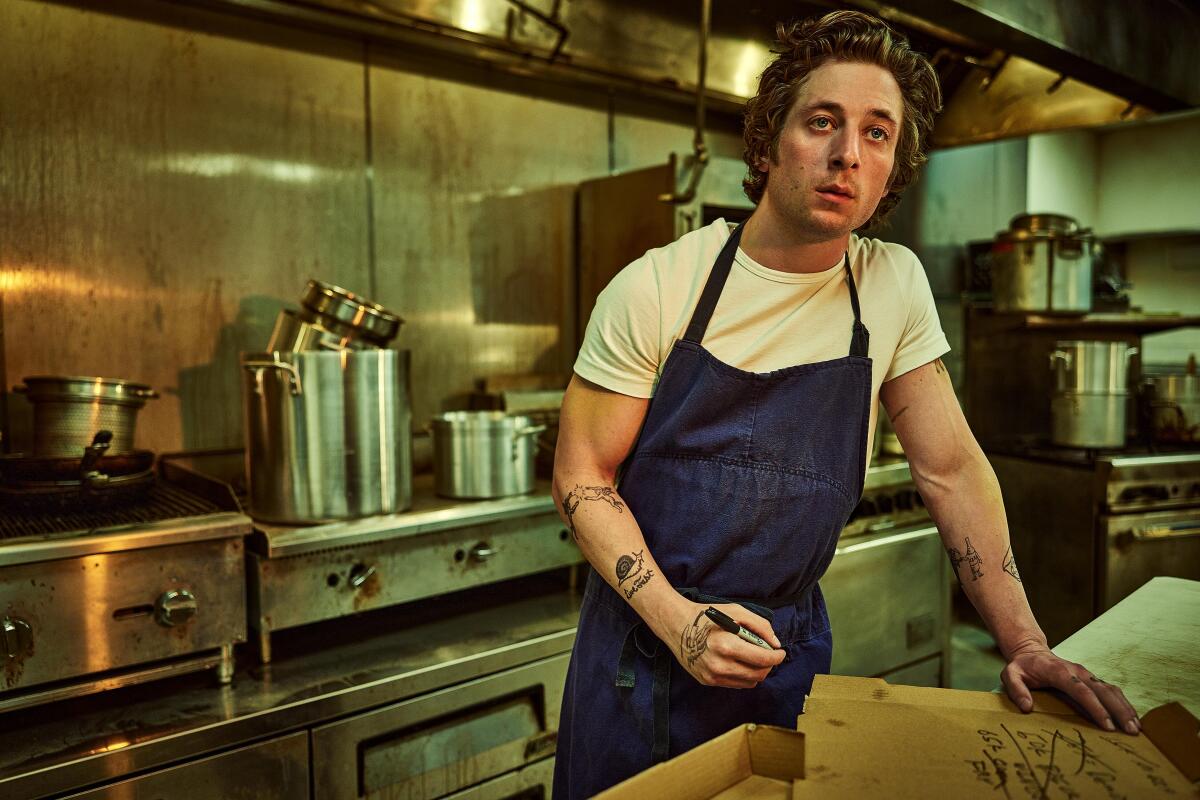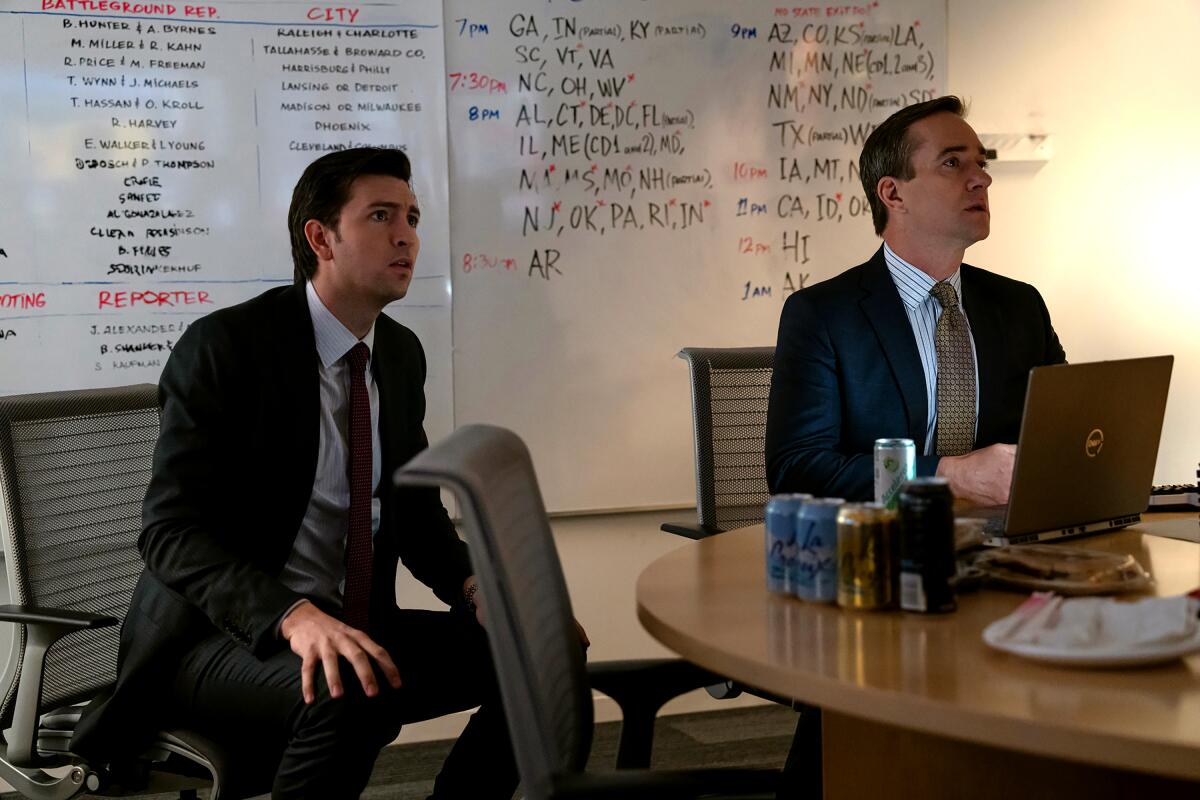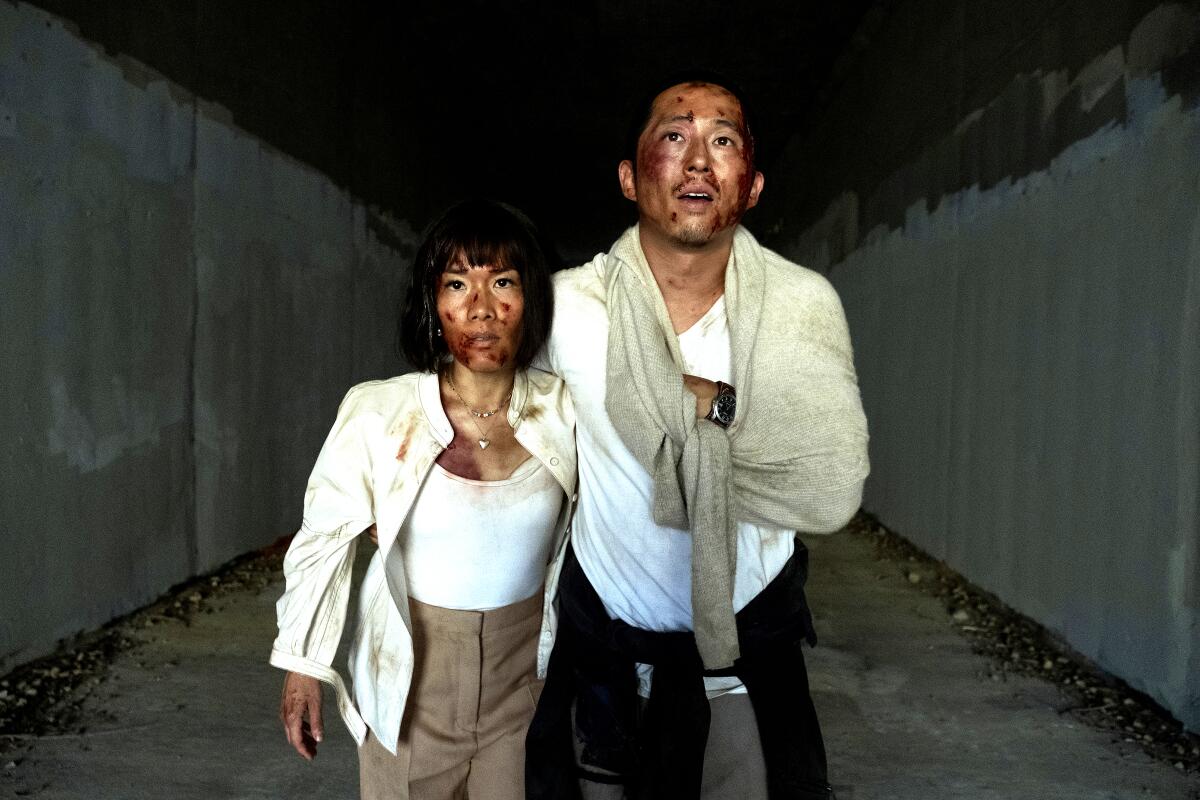Feeling tense? Blame your television

If you thought running a restaurant was stressful, try opening one. Permits, licenses, staffing. Mold and electrical issues. Create a menu and don’t forget to fix the handle on the walk-in. These are the table stakes on the second season of “The Bear,” whose freshman effort garnered 13 Emmy nominations and provoked untold numbers of panic attacks among faithful viewers. (Corner! Yes, chef!) The FX series, created by Christopher Storer and starring Jeremy Allen White as a fine-dining chef tasked with running and then completely altering his late brother’s beloved Chicago beef sandwich shop, turns anxiety into exquisite torture.
It has plenty of company among this year’s Emmy front-runners. HBO’s awards behemoth “Succession” — the two-time drama series winner scooped up 27 nominations for its swan song season — tightened the screws as the addictively despicable Roy family jumped headfirst into the scrum of national politics. (Wince). The Netflix limited series “Beef,” nominated for 13 Emmys, starts with a minor road-rage incident and gets more uncomfortable from there. (Cringe). By comparison, HBO’s “The Last of Us” (25 nominations), which merely deals with postapocalyptic survival, feels light and breezy.

It’s an uncertain world out there, what with an ideologically fractured populace, machines rapidly learning to think for themselves, and mass shootings becoming the rule rather than the exception. And prestige TV doesn’t appear to be in the mood to offer succor. Sure, “Ted Lasso,” bowing out with 21 nominations, kept looking at the bright side of life. Elsewhere, however, TV is in the midst of an anxiety age. And we seem to love it, episode by excruciating episode.
“The Bear” leads the anxious pack, largely through its flair for matching form to content. As Carmy Berzatto and his crew scrambled to stay open in Season 1, putting out fires personal, professional and literal, the camera darted this way and that, the jagged editing enhancing the sense of off-balance frenzy (except for Episode 7, which creates that frenzy through a bravura 18-minute single take). If it weren’t so thoroughly rewarding, even redemptive, it would be exhausting. OK, it’s still pretty exhausting.
Season 2 finds a little more time for grace, including pastry chef Marcus’ lovely interlude in Copenhagen, where he lives on a houseboat, gets stress-free training and quietly saves a man’s life. Then, just as you’re getting settled, along comes the haymaker of Episode 6. A 66-minute flashback episode built around a Christmas dinner hosted by Carmy’s raging narcissist-alcoholic mother (Jamie Lee Curtis, digging deep), “Fishes” plays like a holiday special collaboration between Darren Aronofsky and John Cassavetes, with a little Eugene O’Neill sprinkled in for good measure. Every buried recrimination rises to the surface. As a kitchen timer rings continually, the camera pushes in on the offending device. If you thought your holiday dinners were stressful, the episode seems to say, you ain’t seen nothing yet.

Meanwhile, in the land of the interminably selfish and wicked, “Succession” came to a fittingly excruciating conclusion. Here, too, the action built to a cataclysmic climax, a merging of wealth and power, media and politics, potent enough to turn weaker stomachs.
With patriarch Logan now out of the picture, the Roy siblings could run free to spread their own brand of bile. Tom (Matthew Macfadyen) is now in charge of Fox News doppelganger ATN. It’s election night — feel your blood pressure rising — and the right-wing presidential candidate favored by Roman (Kieran Culkin) is in a tight race. A fire in Milwaukee destroys thousands of ballots. Roman’s candidate has promised to kill a crucial corporate merger if ATN does him a solid and calls the election early for him. Thus we watch as democracy dies in slow motion. Could this actually happen in the real world? It doesn’t matter. “Succession” sells the possibility with dramaturgical precision. Even with two episodes still remaining at that point, this felt like The End.

Then there’s “Beef,” which puts its foot on the gas at the very beginning, with a honk, an extended middle finger and a chase, and keeps it there for the duration. It doesn’t get much more anxious than road rage: the complete loss of control and personal discipline, the self-inflicted danger. But that’s just the first course. Creator Lee Sung Jin puts his leads, Amy (Ali Wong) and Danny (Steven Yeun), through an agonizing existential free fall, peeling back the layers on lifetimes of disappointment and resentment. You find yourself looking through your fingers long after that catalytic chase.
Of course, one person’s anxiety attack is merely another person’s drama. And you can’t have drama without conflict. Still, something about these shows conveys a sort of masochistic pleasure, a desire to put you through the ringer, or maybe make you reach for a tranquilizer. We don’t like to feel anxious — except, it seems, when we’re relaxing at home.
More to Read
From the Oscars to the Emmys.
Get the Envelope newsletter for exclusive awards season coverage, behind-the-scenes stories from the Envelope podcast and columnist Glenn Whipp’s must-read analysis.
You may occasionally receive promotional content from the Los Angeles Times.









